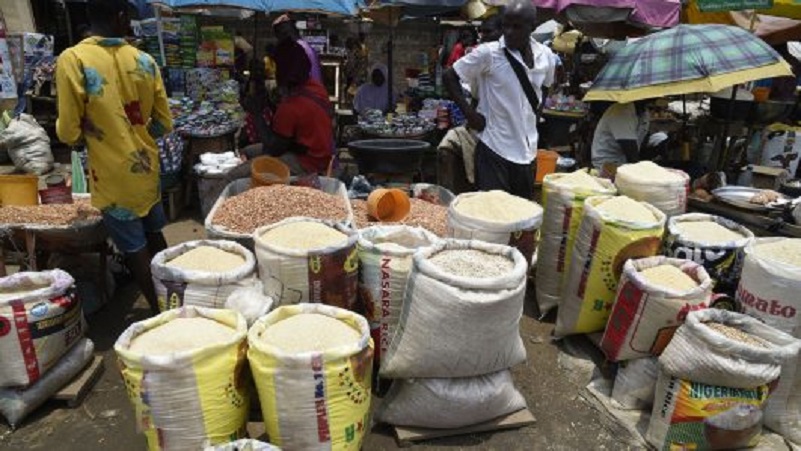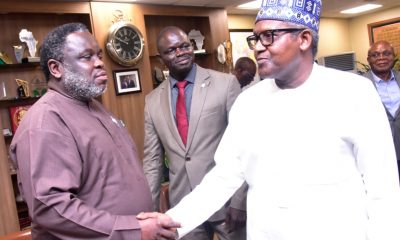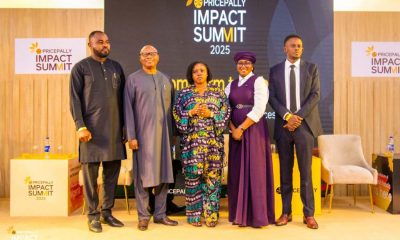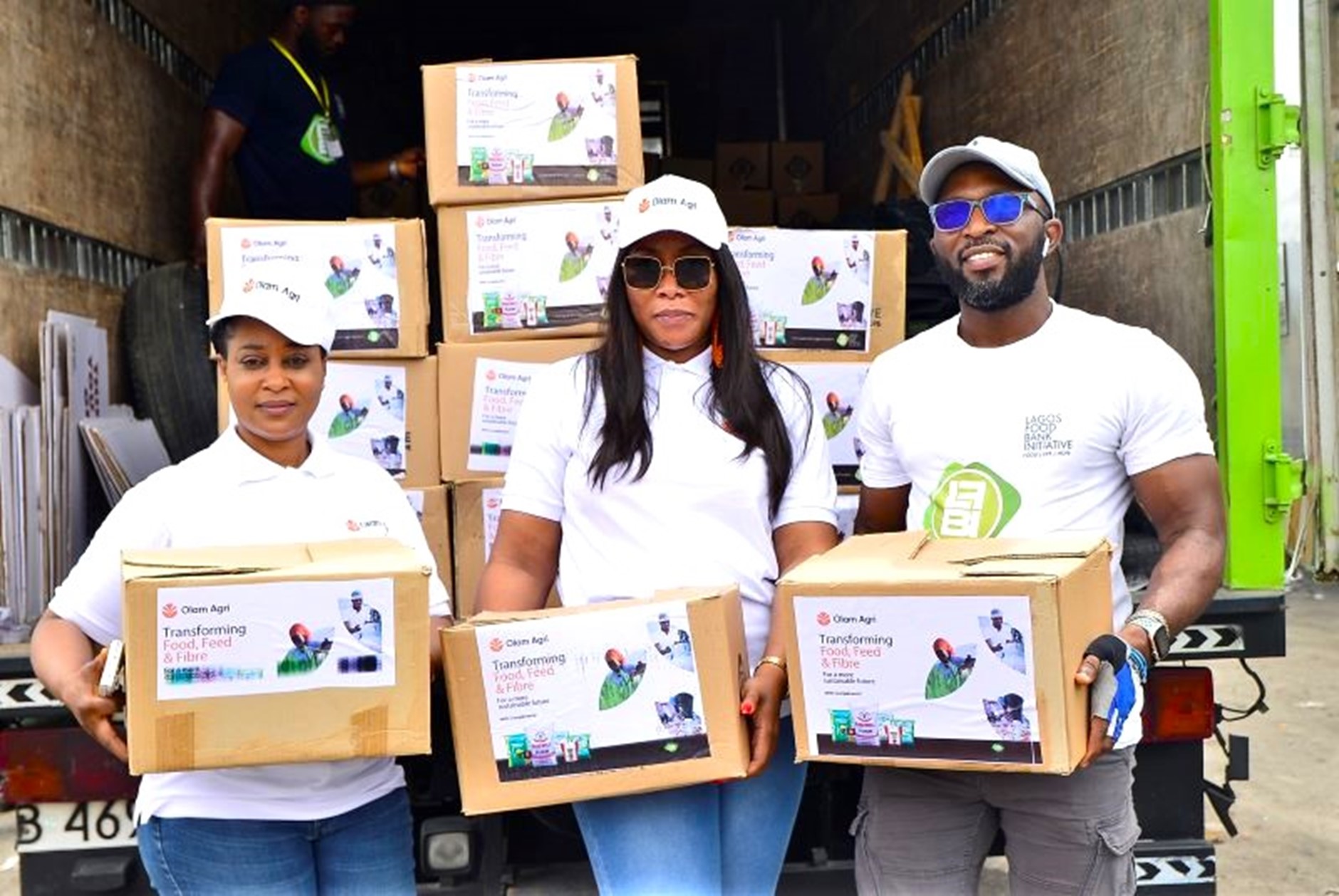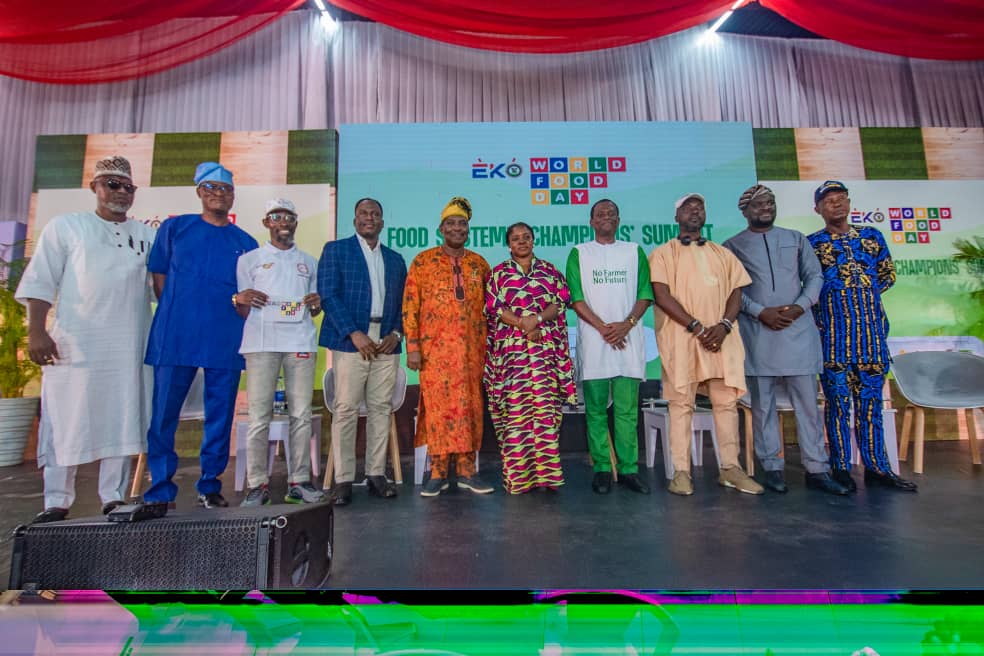Feature/OPED
How Africa Can Ensure Its Food Security
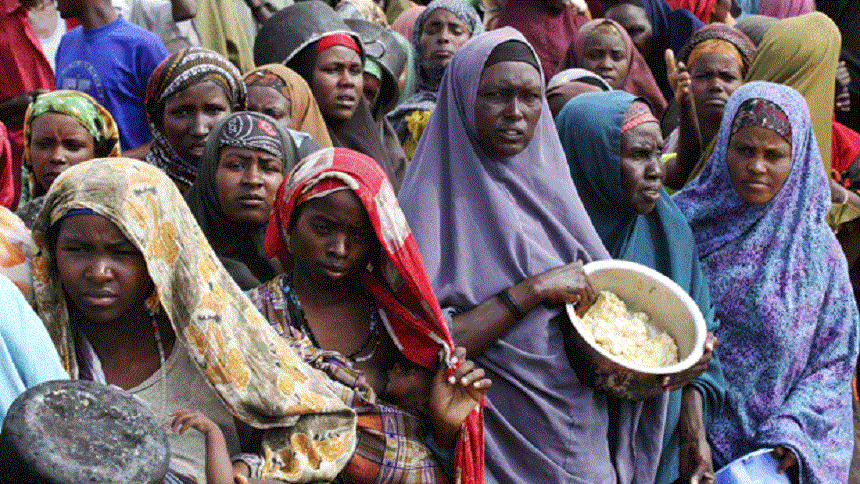
By Professor Maurice Okoli
At least, African leaders gradually recognise the need to work collectively to ensure food security. Food supply has seriously been exacerbated by the Russia-Ukraine conflict, Africa’s persistent internal ethnic conflicts and a series of natural disasters. But more fascinating are the latest arguments over the interconnection between utilising resources for increasing and improving food production and taking adequate measures toward shedding import dependency.
The month of June 2023 was a busy month for African leaders. South African President Cyril Ramaphosa headed the Africa Peace Initiative to Kyiv and St. Petersburg, famous cities in Ukraine and Russia. Then later, he joined his colleagues at the New Global Financial Pact summit in Paris, France. While these trips could not be considered ordinary, the most controversial issues inseparably relate to Africa’s economic development, trade and investment, and sustainable welfare of the population.
As a development economist and researcher, scanning through several reports, Ramaphosa and his colleagues raised one significant question, among others, during their discussions in Paris. And that is the issue of ensuring food security. In practical terms, it has been part of government policy on improving food production and supply to the increasing population, especially in Africa, which stands at an estimated 1.4 billion. Of course, the world’s population is growing, but Africa’s exponential growth has acute challenges, including healthcare, employment and food security.
By halfway through this century, that is, 2050, Africa’s population is estimated to be 2.5 billion, and urban or megacities across Africa will continue experiencing enormous stress or pressure due to massive migration from under-developed parts of African countries. With Russia’s special operation in Ukraine and the sanctions in the history of mankind slammed on Russia by Western and European states, these have sufficiently been acknowledged as drivers of skyrocketing commodity prices and, ultimately, the cost of living. In effect, it’s described as a terrible global instability.
With all these trends even ceaselessly occurring now, Ramaphosa’s preferential steps toward food security, as described in his presentation, that the war has a ‘negative impact’ on the African continent and many other countries. It is, however, an acceptable fact that Africa, which generally depends on massive food imports, has suffered from all-year-round supply interruptions — diverse discussions ceaselessly awash the media landscape over these. For most African leaders, it is the question of food supply or how to sustain or preserve food import dependency. There is no alternative to reconnecting to regular supplies from Russia and Ukraine for these African countries.
During the New Global Financial Pact summit in Paris, African leaders expressed sceptical sentiments, as Ramaphosa and other leaders vehemently reiterated that external pledges and funding have unsuccessfully supported sustainable development goals, including food security in Africa.
Ramaphosa raised the structure of financial institutions, global currency, climate change and economic poverty, that there should be more cooperation and coordination, no fragmentation. There should be reforms in multinational institutions to address development issues, especially in the Global South. Africa should not be treated as beggars but as equals. It does not depend on donations and generosity. Africa should be allowed to be a key player on the global stage.
In stark reality, the global geopolitical processes are now offering the grounds to re-initiate and seek suitable alternatives that depend on century-old approaches and methods to solve national questions. Therefore, development critics may argue how the changes bring it closer to achieving the Sustainable Development Goals (SDGs) and how it will simultaneously bolster Africa’s role in the multipolar world.
Factors Influencing Food Production
Interestingly factors negatively influencing local production, including the agricultural sector, are commonly listed and extensively discussed. Researchers, academics and politicians already recognize them as retarding expected progress and making headways in attaining that status of food self-sufficiency. Some of these factors are drought and climatic extremes, low budget allocation and inappropriate agricultural policies in Africa, poor storage and preservation facilities, poor land tenure system and reduced soil fertilities, inadequate irrigation facilities and poor methods of pest and disease control.
Some aspects of traditional African culture related to food production have become less practised in recent years. But state attitudes are not stimulating either in this direction. Across Africa, the consumption culture is tied to foreign imported products as it is widely interpreted as status-symbol, considered as belonging to a well-defined upper class in the society. Thus this consumer culture becomes a driving factor towards continuity in importing food that fills modern shopping malls in Africa.
The most popular rhetoric, more or less chorus, is that although it has abundant natural resources, Africa remains the world’s poorest and least-developed continent, resulting from various causes that may include deep-seated political corruption. According to the United Nations Human Development Report in 2003, the bottom 24 ranked nations (151st to 175th) were all African states.
Thambo Mbeki, former South African President, has argued these aspects in his reports on illicit capital flows abroad. In a recently published analysis, Mbeki underlined that loans obtained for undertaking development infrastructure, including agricultural and related industrial sectors, are siphoned back to foreign banks for politicians.
Basic geography teaches us that Africa has enormous resources, encompassing the vast landmass, vegetation, and water resources, including the lakes and rivers. The Congo, Nile, Zambezi, Niger and Lake Victoria are among its rivers. Yet the continent is the second driest in the world, with millions of Africans suffering yearly from water shortages. It requires mechanising agricultural practices, offering specialised short training and adequate support for local farmers as aspects of measures and steps toward import substitution.
Addressing food security challenges in Africa
Economists argue that possibly adopting, to some degree, import substitution policies are not directed at escaping international trade. It is an attempt to utilise, at the maximum, the untapped available resources in the production sector and, secondly, redirect budgetary finances into needy significant economic sectors. Understandably, Africa depends on food imports to feed its population. It has become a common rules-based practice across Africa.
On the other hand, potential exporting foreign states generate revenues for their budget. This is also an undeniable fact as many countries around the world make conscious efforts to increase the export of commodities to foreign markets. According to Agriculture Ministry’s AgroExport Center, Russia targets $33 billion per year (annually) as revenue through massive export of grains and meat poultry to Africa.
By increasing grain exports to African countries, Russia aims to enhance the competitiveness of Russian agricultural goods in the African market. On the contrary, several international organisations have also expressed that African leaders must adopt import substitution mechanisms and use their financial resources to strengthen agricultural production systems.
At the G7 Summit in June 2022, President Joe Biden and G7 leaders announced over $4.5 billion to address global food security, over half of which will come from the United States. This $2.76 billion in U.S. government funding will help protect the world’s most vulnerable populations and mitigate the impacts of growing food insecurity and malnutrition by building production capacity and more resilient agriculture and food systems worldwide and responding to immediate emergency food needs.
U.S. Congress allocated $336.5 million to bilateral programs for Sub-Saharan African countries, including Burkina Faso, the Democratic Republic of the Congo, Ethiopia, Ghana, Guinea, Kenya, Liberia, Madagascar, Malawi, Mali, Mozambique, Niger, Nigeria, Rwanda, Senegal, Sierra Leone, Somalia, South Sudan, Tanzania, Uganda, Zambia, and Zimbabwe and regional programs in southern Africa, west Africa, and the Sahel.
Using Zimbabwe as a Classical Example
Compared to food-importing African countries, Zimbabwe has increased wheat production, especially during the current Russia-Ukraine crisis. This achievement was attributed to efforts in mobilising local scientists to improve the crop’s production. Zimbabwe is an African country under Western sanctions for 25 years, hindering imports of much-needed machinery and other inputs to drive agriculture.
At the African Green Revolution Forum (AGRF) summit held from September 5 to 9, 2022, in Rwanda, President Emmerson Mnangagwa told the gathering that “we used to depend on importation of wheat from Ukraine in the past, but now we have been able to produce our own. To a considerable extent, the crisis in that country has not affected us. There is an urgent need to adopt a progressive approach and re-purpose food policies to address the emerging challenges affecting our entire food systems in Africa.”
As much as there are classical admirable lessons to learn from Zimbabwe, African leaders ignore these. Zimbabwe shares the same negative consequences of colonialism with many African countries. But in an additional case, it has struggled with sanctions imposed on the land, making conditions harder. Zimbabwe has been looking for foreign partners from other countries to transfer technology and industrialise its ailing economy in the southern African region.
While several African countries largely depend on Russia and Ukraine for their regular supply of wheat and grains, even despite the persistent geopolitical warring situation, Zimbabwe has recorded its highest wheat harvest during the last agricultural production in 2022. It emerges as one of the few African countries with an import substitution agricultural policy and strategically working self-sufficiency. Worth suggesting that African leaders have to learn from Zimbabwe – a landlocked southern African country.
Looking for Inside Solutions
At least over the past few years, even long before the Russia-Ukraine crisis, there have been glowing signs from two African banks calling for increased food production. African Development Bank (AfDB) and the African Export-Import Bank (Afreximbank) have gained increasing prominence for their work with the private sectors within Africa. These two banks support the agricultural sectors, but more is needed to meet the highest target.
At the Paris summit, AfDB President Akinwumi Adesina, African and European heads of government and representatives of development partners on the sidelines held discussions about the Alliance for Green Infrastructure in Africa. The key aim is accelerating the financing of transformational climate-resilient and greener infrastructure projects in Africa and attracting new partners and financiers. Adesina, formerly Nigeria’s Minister of Agriculture and Rural Development, now the 8th President of the African Development Bank, has consistently been pushing for increased domestic agriculture to attain food self-sufficiency and ensure food security on the continent.
Of particular concern is that over 900 million people are still impoverished on the continent. Over 283 million Africans suffer from hunger, including over 216 million children who suffer from malnutrition. The situation is more serious due to climate change, including severe droughts, floods and cyclones that have devastated parts of Africa. Today, much of the Horn Africa and the Sahel last had rain several seasons ago. The resources Africa needs need to be there, explains AfDB President Akinwumi Adesina.
“I am excited about what the bank is doing to support farmers to adapt to climate change through our flagship program —Technologies for African Agricultural Transformation (TAAT). It is a platform implemented through partnerships with national and regional agricultural research institutions and the private sector. It is the largest ever effort to get technologies at scale to millions of farmers across Africa,” he wrote in his report.
Over the past three years, TAAT delivered climate-resilient agricultural technologies to 25 million farmers or 62% of the 40 million farmer target. The depth of consistent work of this bank is to enhance food processing, value addition and competitiveness of agricultural supply chains across Africa. The bank is committing resources for the establishment of Special Agro-Industrial Processing Zones. With its partners (including the Islamic Development Bank and International Fund for Agricultural Development), the bank has invested more than $1.5 billion to establish these zones in eleven countries.
Africa’s ability to feed nine billion people by 2050 is not a foregone conclusion; it is a call to action. We must harness our strengths, confront challenges, and work relentlessly towards our shared vision. Therefore, let us rise to this grand challenge. Let us forge ahead, knowing that our efforts today will determine the future of food in the world. It is necessary to unlock Africa’s potential in agriculture. Africa must feed itself.
The Wake-Up Bell for Action
It may take us by surprise when we know that 81% of the sub-Saharan African population lives on less than $2.50 (PPP) per day in 2023, compared with 86% for India. China and India are populous but are moving faster than Africa. China has a more substantial global economic influence than India, but Africa still needs to progress in various economic sectors.
The latest economic trend is that Africa is now at risk of being in debt once again, particularly in sub-Saharan African countries. It receives the most external funds for its development from Development funding sponsors such as the United States, Europe, China, France and Britain or multilateral blocs such as G7 states, the International Monetary Fund (IMF) and the World Bank. Other institutions and organisations, such as Millennium Challenge Corporation (MCC) and International Development Finance Corporation (DFC), also engage with Africa. In addition, the Asian and Arab Banks are showing practical actions. The cry for the National Development Bank of the BRICS has yet to think of Africa.
In this article, it is necessary in our discussions to appreciate the geographical facts that Africa is the world’s second-largest and second-most-populous continent, after Asia, in both aspects. Despite a wide range of natural resources, Africa is the least wealthy continent per capita and second-least wealthy by total wealth, behind Oceania. Scholars have attributed this to different factors, including geography, climate, tribalism, colonialism, neocolonialism, lack of democracy, and worse Africa-wide corruption. Despite this low concentration of wealth, recent economic expansion and the large and young population make Africa a crucial financial market in the broader global context.
In a nutshell, adopting measures for establishing food security is crucial to sustainable development. Addressing food security, therefore, is one of the keys for Africa in this 21st century. From the above perspectives, African leaders have to focus and redirect both human and financial resources toward increasing local production as the surest approach in ensuring sustainable food security for the estimated 1.4 billion population in Africa, and this most possibly falls within the framework of the Agenda 2063 of the African Union.
By Professor Maurice Okoli is a fellow at the Institute for African Studies and the Institute of World Economy and International Relations, Russian Academy of Sciences. He is also a fellow at the North-Eastern Federal University of Russia
Feature/OPED
Daniel Koussou Highlights Self-Awareness as Key to Business Success

By Adedapo Adesanya
At a time when young entrepreneurs are reshaping global industries—including the traditionally capital-intensive oil and gas sector—Ambassador Daniel Koussou has emerged as a compelling example of how resilience, strategic foresight, and disciplined execution can transform modest beginnings into a thriving business conglomerate.
Koussou, who is the chairman of the Nigeria Chapter of the International Human Rights Observatory-Africa (IHRO-Africa), currently heads the Committee on Economic Diplomacy, Trade and Investment for the forum’s Nigeria chapter. He is one of the young entrepreneurs instilling a culture of nation-building and leadership dynamics that are key to the nation’s transformation in the new millennium.
The entrepreneurial landscape in Nigeria is rapidly evolving, with leaders like Koussou paving the way for innovation and growth, and changing the face of the global business climate. Being enthusiastic about entrepreneurship, Koussou notes that “the best thing that can happen to any entrepreneur is to start chasing their dreams as early as possible. One of the first things I realised in life is self-awareness. If you want to connect the dots, you must start early and know your purpose.”
Successful business people are passionate about their business and stubbornly driven to succeed. Koussou stresses the importance of persistence and resilience. He says he realised early that he had a ‘calling’ and pursued it with all his strength, “working long weekends and into the night, giving up all but necessary expenditures, and pressing on through severe setbacks.”
However, he clarifies that what accounted for an early success is not just tenacity but also the ability to adapt, to recognise and respond to rapidly changing markets and unexpected events.
Ambassador Koussou is the CEO of Dau-O GIK Oil and Gas Limited, an indigenous oil and natural gas company with a global outlook, delivering solutions that power industries, strengthen communities, and fuel progress. The firm’s operations span exploration, production, refining, and distribution.
Recognising the value of strategic alliances, Koussou partners with business like-minds, a move that significantly bolsters Dau-O GIK’s credibility and capacity in the oil industry. This partnership exemplifies the importance of building strong networks and collaborations.
The astute businessman, who was recently nominated by the African Union’s Agenda 2063 as AU Special Envoy on Oil and Gas (Continental), admonishes young entrepreneurs to be disciplined and firm in their decision-making, a quality he attributed to his success as a player in the oil and gas sector. By embracing opportunities, building strong partnerships, and maintaining a commitment to excellence, Koussou has not only achieved personal success but has also set a benchmark for future generations of African entrepreneurs.
His journey serves as a powerful reminder that with determination and vision, success is within reach.
Feature/OPED
Pension for Informal Workers Nigeria: Bridging the Pension Gap

***The Case for Informal Sector Pensions in Nigeria
***A Crucial National Conversation
By Timi Olubiyi, PhD
In Nigeria today, the phrase “pension” evokes many different mixed reactions. For many civil servants and people in the corporate world, it conjures a bit of hope, but for the majority in the informal sector, who are in the majority in Nigeria, it is bleak. Millions of Nigerians are facing old age without any financial security due to a lack of retirement plans and a stable pension plan. Particularly, the millions who operate in markets, corner shops, transportation, agriculture, and loads of the nano and micro scale enterprises operators are without pension plans or retirement hope.
From the observation of the author and available records, staggering around 90 per cent of Nigeria’s workforce operates in the informal economy. Yet current pension coverage for this group is virtually non-existent. As observed, the absence of meaningful pension participation by this class of worker reinforces the vulnerability, intensifies poverty among older people, and puts pressure on families who are ill-equipped to shoulder the burden.
The significance of having a pension plan for informal workers in Nigeria, given the large number of people in that sector and the high level of unemployment and underemployment, cannot be overstated. As it is deeply connected to sustenance and the level of poverty in the country. Pension for informal workers in Nigeria is not just a technical policy matter; it is a story about dignity, security, and whether a lifetime of hard work ends in rest or in desperation.
Nigeria’s pension system, primarily structured around the Contributory Pension Scheme (CPS) managed by the National Pension Commission (PenCom), has made significant progress for formal sector employees, yet the large portion of the informal workforce which are traders, artisans, okada riders, small-scale farmers, domestic workers, and gig economy participants who drive the real engine of the economy.
Though the Micro Pension Plan (MPP) was launched in 2019, which is intended to provide a voluntary contributory framework for informal workers, its uptake has been underwhelming; after several years, only a fraction of the millions targeted have enrolled, and far fewer contribute actively. One big reason for this is that, unlike formal workers who receive regular salaries and have employers who deduct and remit pension contributions, informal workers face irregular incomes, a lack of documentation, limited financial literacy, and deep mistrust of government institutions, making traditional pension models ill-suited for their realities.
Moreso the informal worker most times live on day-to-day income. For instance, a motorcycle rider in Lagos who earns ₦14,000 on a good day but must pay for fuel, bike maintenance, police “settlements,” and family expenses, how can he realistically commit to a monthly pension contribution when his income fluctuates wildly? So, the Micro Pension Plan for the informal sector participation will remain low due to poor awareness, complex processes, lack of tailored contribution flexibility, and limited trust.
To truly make pensions work for informal workers, Nigeria must rethink the system from the ground up, designing it around the lived realities of its people rather than forcing them into rigid formal-sector structures. First, the government should introduce a co-contributory model where the state matches a percentage of informal workers’ savings, similar to what is practised in some European countries, turning pension contributions into a powerful incentive rather than a burdensome obligation.
Second, digital technology must be leveraged aggressively—mobile-based pension platforms linked to BVN or NIN could allow daily, weekly, or micro-contributions as small as ₦100, integrating seamlessly with fintech apps like OPay, Paga, or bank USSD services so that saving becomes as easy as buying airtime.
Third, automatic enrollment through cooperatives, trade unions, market associations, and transport unions could significantly expand coverage, with opt-out rather than opt-in mechanisms to counter human inertia.
Fourth, financial literacy campaigns in local languages via radio, community leaders, and religious institutions are essential to rebuild trust and demonstrate that pensions are not a “government scam” but a personal safety net.
Fifth, Nigeria should consider a universal social pension for elderly citizens who never participated in formal or informal schemes, modelled after systems in countries like Denmark and the Netherlands, ensuring that no Nigerian dies in poverty simply because they worked outside formal structures.
Sixth, investment strategies for pension funds must prioritise both security and development—allocating a portion to infrastructure projects that create jobs, improve power supply, and stimulate economic growth while maintaining prudent risk management.
Seventh, inflation protection should be built into pension payouts so that retirees’ purchasing power is not eroded by Nigeria’s volatile economy.
Eighth, the system must be inclusive of women, who dominate the informal sector yet often lack property rights or formal identification, by simplifying documentation requirements and providing gender-sensitive outreach.
Ninth, limited emergency withdrawal options could be introduced—strictly regulated—to help contributors handle crises without abandoning the system entirely.
Finally, transparency and accountability are non-negotiable; regular public reporting, independent audits, and user-friendly dashboards would strengthen confidence that contributions are safe and growing. If Nigeria can blend its innovative spirit with lessons from global best practices—combining Denmark’s social security ethos, Singapore’s savings discipline, and Canada’s inclusivity—it could transform the lives of millions of informal workers who currently face retirement with fear rather than hope.
Imagine Aisha, years from now, closing her market stall not in exhaustion and anxiety but in calm assurance that her pension will cover her basic needs; imagine Tunde hanging up his helmet knowing he can afford healthcare and shelter; imagine Ngozi harvesting not just crops but the fruits of a lifetime of secure savings. The suspense that hangs over the future of Nigeria’s informal workers can be resolved, but only if policymakers act boldly, creatively, and compassionately—because a nation that allows its hardest workers to age in poverty is a nation that undermines its own prosperity, while a nation that secures their retirement builds not just pensions, but peace.
Hope comes from innovation. Fintech-powered pension models that allow small, frequent contributions similar to informal savings associations like esusu offer ways to integrate pensions into existing savings cultures. Making pension contributions compatible with mobile money and agent networks could drastically reduce barriers to entry. Hope comes from public education. Building financial literacy campaigns, partnering with community leaders, marketplaces, trade associations, and digital platforms can help shift perceptions. A pension should be understood not as a distant bureaucratic programme, but as future self-insurance and dignity
The significance of having a pension plan for informal workers in Nigeria, given its large informal sector and high level of unemployment and underemployment, cannot be overstated, as it is deeply connected to social stability, economic sustainability, poverty reduction, and national development.
First, from a social protection and human dignity perspective, a pension plan for informal workers is critical because it provides a safety net for old age. Nigeria’s informal sector includes traders, artisans, mechanics, tailors, hairdressers, okada riders, gig workers, domestic workers, small-scale farmers, and street vendors, many of whom work hard throughout their lives but have no formal retirement benefits. Without a pension, these individuals often become completely dependent on their children, relatives, or charity in old age, which can strain families and increase intergenerational poverty. A well-structured pension system ensures that ageing informal workers can maintain a basic standard of living, access healthcare, and avoid extreme deprivation, thereby preserving their dignity and reducing elderly vulnerability.
Second, from an economic stability and poverty reduction standpoint, pensions play a crucial role in reducing old-age poverty. Nigeria already struggles with high poverty levels, and a large proportion of elderly citizens without income support exacerbates this problem. When informal workers lack pension savings, they continue working well into old age, often in physically demanding jobs, which reduces productivity and increases health risks. A pension system allows for smoother retirement transitions, reduces reliance on welfare, and ensures that older citizens remain consumers rather than economic burdens, thereby sustaining economic activity.
Third, pensions for informal workers are significant for financial inclusion and savings culture. Many Nigerians in the informal sector operate primarily in cash and have limited engagement with formal financial institutions. A pension plan tailored to informal workers, especially one integrated with mobile money and digital platforms, can encourage regular saving, improve financial literacy, and bring millions of people into the formal financial system. This, in turn, strengthens Nigeria’s overall financial sector and increases the pool of domestic savings available for investment in infrastructure, businesses, and development projects.
Fourth, the significance is evident in reducing dependence on government emergency support. Currently, the Nigerian government often has to intervene with ad-hoc social assistance programs, especially during crises such as the COVID-19 pandemic, inflation shocks, or economic downturns. If informal workers had functional pension savings, they would be better able to absorb economic shocks in retirement without relying heavily on government aid, reducing fiscal pressure on the state.
Fifth, pensions for informal workers contribute to intergenerational equity and family stability. In Nigeria, many elderly parents depend on their working children for survival, which places financial strain on younger generations who may already be struggling with unemployment, housing costs, and education expenses. A pension system reduces this burden, allowing younger Nigerians to invest in their own futures rather than being trapped in a cycle of supporting ageing relatives without external assistance.
Sixth, from a national development perspective, including informal workers in the pension system strengthens Nigeria’s long-term economic planning. Pension funds represent large pools of capital that can be invested in critical sectors such as housing, energy, transportation, and manufacturing. If millions of informal workers contribute even in small amounts, this could significantly expand Nigeria’s pension fund assets, providing stable, long-term financing for development projects that create jobs and stimulate growth.
Seventh, pensions for informal workers are important for gender equity, because women dominate many informal occupations in Nigeria, such as petty trading, market vending, tailoring, and caregiving roles. These women often have lower lifetime earnings, limited access to formal employment, and fewer assets. A targeted informal sector pension scheme can protect elderly women from destitution and reduce gender-based economic inequality in old age.
Eighth, the significance is also linked to public trust and governance. A transparent, accessible, and reliable pension system for informal workers can strengthen citizens’ trust in government institutions. Many informal workers currently distrust government programs due to past corruption, failed schemes, or poor implementation. A well-functioning pension plan that delivers real benefits would demonstrate that the state values all citizens, not just formal sector employees.
Lastly, given Nigeria’s demographic reality of a large and growing population, failing to integrate informal workers into a pension framework poses serious long-term risks. As life expectancy increases, the number of elderly Nigerians will rise significantly in the coming decades. Without a structured pension system for informal workers, Nigeria could face a severe old-age crisis characterised by mass poverty, social unrest, and increased pressure on healthcare and social services.
In summary, having a pension plan for informal workers in Nigeria is significant because it promotes social security, reduces poverty, enhances financial inclusion, supports economic stability, eases intergenerational burdens, strengthens national development, promotes gender equity, builds public trust, and prepares the country for its ageing population. For a nation where the majority of workers are informal, excluding them from pension coverage is not just an oversight; it is a major structural weakness that must be urgently addressed for Nigeria’s long-term prosperity and social cohesion.
Feature/OPED
Revived Argungu International Fishing Festival Shines as Access Bank Backs Culture, Tourism Growth

The successful hosting of the 2026 Argungu International Fishing Festival has spotlighted the growing impact of strategic public-private partnerships, with Access Bank and Kebbi State jointly reinforcing efforts to promote cultural heritage, tourism development, and local economic growth following the globally attended celebration in Argungu.
At the grand finale, Special Guest of Honour, Mr Bola Tinubu, praised the festival’s enduring national significance, describing it as a powerful expression of unity, resilience, and peaceful coexistence.
“This festival represents a remarkable history and remains a powerful symbol of unity, resilience, and peaceful coexistence among Nigerians. It reflects the richness of our culture, the strength of our traditions, and the opportunities that lie in harnessing our natural resources for national development. The organisation, security arrangements, and outlook demonstrate what is possible when leadership is purposeful and inclusive.”
State authorities noted that renewed institutional backing has strengthened the festival’s global appeal and positioned it once again as a major tourism and cultural platform capable of attracting international visitors and investors.
“Argungu has always been an iconic international event that drew visitors from across the world. With renewed partnerships and stronger institutional support, we are confident it will return to that global stage and expand opportunities for our people through tourism, culture, and enterprise.”
Speaking on behalf of Access Bank, Executive Director, Commercial Banking Division, Hadiza Ambursa, emphasised the institution’s long-standing commitment to supporting initiatives that preserve heritage and create economic opportunities.
“We actively support cultural development through initiatives like this festival and collaborations such as our partnership with the National Theatre to promote Nigerian arts and heritage. Across states, especially within the public sector space where we do quite a lot, we work with governments on priorities that matter to them. Tourism holds enormous potential, and while we have supported several hotels with expansion financing, we remain open to working with partners interested in developing the sector further.”
Reports from the News Agency of Nigeria indicated that more than 50,000 fishermen entered the historic Matan Fada River during the competition. The overall winner, Abubakar Usman from Maiyama Local Government Area, secured victory with a 59-kilogram catch, earning vehicles donated by Sokoto State and a cash prize. Other top contestants from Argungu and Jega also received vehicles, motorcycles and monetary rewards, including sponsorship support from WACOT Rice Limited.
Recognised by UNESCO as an Intangible Cultural Heritage of Humanity, the festival blends traditional fishing contests with boat regattas, durbar processions, performances, and international competitions, drawing visitors from across Nigeria and beyond.
With the 2026 edition concluded successfully, stakeholders say the strengthened collaboration between government and private-sector partners signals a renewed era for Argungu as a flagship cultural tourism destination capable of driving inclusive growth, preserving tradition, and projecting Nigeria’s heritage on the world stage.
-

 Feature/OPED6 years ago
Feature/OPED6 years agoDavos was Different this year
-
Travel/Tourism10 years ago
Lagos Seals Western Lodge Hotel In Ikorodu
-

 Showbiz3 years ago
Showbiz3 years agoEstranged Lover Releases Videos of Empress Njamah Bathing
-

 Banking8 years ago
Banking8 years agoSort Codes of GTBank Branches in Nigeria
-

 Economy3 years ago
Economy3 years agoSubsidy Removal: CNG at N130 Per Litre Cheaper Than Petrol—IPMAN
-

 Banking3 years ago
Banking3 years agoSort Codes of UBA Branches in Nigeria
-

 Banking3 years ago
Banking3 years agoFirst Bank Announces Planned Downtime
-

 Sports3 years ago
Sports3 years agoHighest Paid Nigerian Footballer – How Much Do Nigerian Footballers Earn


